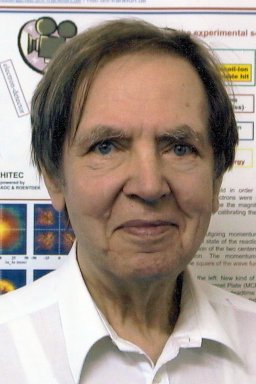
Yury N. Demkov
(12.04.1926 - 15.11.2010)
Professor
Yury Nikolayevich Demkov was born on April 12, 1926 in Leningrad, USSR (now St. Petersburg, Russia) to a family of architects. His father designed and constructed public buildings in Leningrad. He died in Leningrad in 1941 when the city was under siege during World War II. His mother was one of the first female Russian architects; she designed and built public buildings in many cities of the USSR. In 1941, when the war approached Leningrad, Yury and his mother moved to Yaroslavl and then to Kuibyshev (now Samara). In 1943, after he finished high school, Yury enrolled in Moscow Steel Institute. In 1944, when he turned 18, he was drafted to the Red Army and took part in World War II. When the army was advancing to the West, he walked through Ukraine, Poland, and Germany. After the victory, he was dismissed from the army in October of 1945 and returned to Leningrad. Yury was admitted to the Physics Department of the Leningrad State University and graduated with honors in 1949. His scientific adviser was Professor M. G. Veselov of the Theoretical Physics Division (the Division was headed by Academician V. A. Fock, an outstanding theoretical physicist and one of the pioneers of quantum mechanics). Upon graduation, Yu. N. Demkov was offered an Assistant Professor position, and since then until his death he worked for the Leningrad(St. Petersburg) State University. In 1954 he defended his PhD thesis, and in 1966 he got a Doctor of Science degree. Yu. N. Demkov occupied successively positions of an Assistant Professor, Senior Researcher, Associate Professor, and Professor. In 1975 - 1991 he served as a Head of the Quantum Mechanics Division of the Physics Department.
His most important results Yu. N. Demkov obtained in the quantum theory of atomic collisions beginning with his diploma work on resonance charge transfer. Such terms as 'Demkov model', 'Demkov-Osherov model', 'Rosen-Zener-Demkov model' are well known in the theory of non-adiabatic transitions. Besides that, he studied variational principles in the collision theory and wrote a monograph on this subject (1958, English translation 1963). Together with his former student, Professor V. N. Ostrovsky, and Professor G. F. Drukarev, Yu. N. Demkov carried out research on the method of zero-range potentials in atomic physics which resulted in a book by Yu. N. Demkov and V. N. Ostrovsky (1975, English translation 1988). In a series of papers, Yu. N. Demkov and V. N. Ostrovsky studied a symmetry of energy levels filling in the periodic table and explained the well-known "n+l" rule. A major contribution of Yu. N. Demkov to the scattering theory was discovery and exploration of the so-called harmonic scattering (in collaboration with I. V. Komarov, A. P. Scherbakov, and D. I. Abramov) where the Euler - Cauchy mathematical theory was applied to the study of scattering of fast charged particles under small angles by electrostatic and magnetostatic targets. In the last years, Yu. N. Demkov worked on the exact solutions of the multistate Landau-Zener type models. His very last article on superfocusing in atomic and nuclear channeling scattering was published in Physics of Atomic Nuclei (2009).
Professor Demkov maintained collaboration with many research institutions within the USSR (Leningrad, Moscow, Voronezh, Riga, Vilnius, Tbilisi, Chisinau, Tashkent, Minsk) and abroad (Yugoslavia, Germany, Hungary, USA, Britain, France, Japan, Netherlands, Denmark, Sweden). Starting 1964, he traveled much for research purposes. In 1975, he spent one year as a visiting scholar at JILA (Boulder, Colorado); for 2003-2004 academic year, he had a Mercator professorship at Goethe University (Frankfurt, Germany). He took part in many international conferences and served as a member of the program committees of the conferences on electronic and atomic collisions (ICPEAC, 1967 to 2003).
Professor Demkov founded a research group on the theory of atomic collisions at the Leningrad State University. He was always open for scientific discussions and shared his knowledge and experience with young people. He had brilliant intuition and generated many original ideas in various areas of physics. Some of these ideas had been elaborated by Demkov himself, his students and co-workers, and others are still waiting for further research.
We will remember Yu. N. Demkov for his outstanding contribution to theoretical atomic physics, his achievements as an educator, and his warm personality.